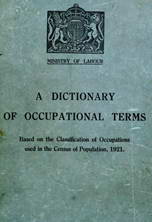A Dictionary of Occupational Terms Based on the Classification of Occupations used in the Census of Population, 1921.

ORDER XII.—TEXTILE WORKERS
Sub-order 1.—Textile Workers
396.—Jacquard Punchers and Card Cutters
Back to List of Occupational Codes
- card cutter, jacquard card cutter, pattern cutter
- (i) see puncher;
- (ii) (lace) cuts sheets of cardboard specially prepared for jacquard work into strips for jacquard cards, using either hand or power-driven cutter or guillotine.
- perforator, card perforator, jacquard perforator
- see puncher.
- piano puncher
- see puncher.
- puncher, card puncher, jacquard puncher
; card cutter, jacquard card cutter, pattern cutter, perforator, card perforator, jacquard perforator, piano puncher, stamper, card stamper, jacquard, stamper
- (i) places plain cards in a card cutting machine, usually a piano punching machine, i.e. a machine fitted, like a piano, with keys, which ' actuate punches by means of levers; depresses keys and so operates machine, which cuts, pierces, or stamps holes in cards, according to a set design (either a paper pattern, a string pattern or an already cut card), ready for use in "jacquard" or "dobby" looms (used for weaving carpets and figured or fancy fabrics), or in lace making;
- (ii) for Swiss embroidery machine, follows point by point, with a flexible metal arm, an enlarged vertical design, thereby making at each point an electric contact with machine which punches holes in jacquard card, as it is slowly unwound from revolving drum.
- reader-in
- reads from a design paper, and transfers pattern to jacquard cards by pulling selected cords in reading-in punching machine and operating foot levers, thereby releasing springs which drive punches through cards; cf. piano puncher, card cutter.
- stamper, card stamper, jacquard stamper
- see puncher.
Back to List of Occupational Codes
From:
A Dictionary of Occupational Terms Based on the Classification of Occupations used in the Census of Population, 1921,
Ministry of Labour, 1927. Digitised by Peter Christian, August, 2016. This text is in the Public Domain. 
